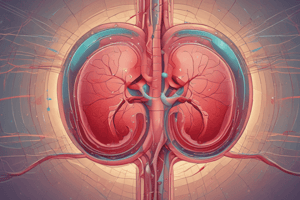Podcast
Questions and Answers
What physiological change in older persons leads to a decreased ability to concentrate urine?
What physiological change in older persons leads to a decreased ability to concentrate urine?
- Increased thirst mechanism
- Increased renal blood flow
- Decreased glomerular filtration rate (correct)
- Thickening of the dermis
Which hormone is typically increased in older adults, contributing to fluid balance?
Which hormone is typically increased in older adults, contributing to fluid balance?
- Aldosterone
- ADH (correct)
- Renin
- Cortisol
What is a consequence of decreased thirst mechanism in older individuals?
What is a consequence of decreased thirst mechanism in older individuals?
- Decreased serum sodium levels
- Increased fluid intake
- Increased risk of hypernatremia (correct)
- Improved electrolyte balance
Which factor may lead frail older individuals to intentionally restrict fluid intake?
Which factor may lead frail older individuals to intentionally restrict fluid intake?
How does aging affect the renal blood flow in older individuals?
How does aging affect the renal blood flow in older individuals?
What misconception should healthcare providers avoid when assessing older patients?
What misconception should healthcare providers avoid when assessing older patients?
What functional change may impair an older person's ability to obtain fluids independently?
What functional change may impair an older person's ability to obtain fluids independently?
What can cause hypernatremia?
What can cause hypernatremia?
Which of the following is a common cause of hyponatremia?
Which of the following is a common cause of hyponatremia?
Which hormone primarily influences sodium regulation in the kidneys?
Which hormone primarily influences sodium regulation in the kidneys?
What is the role of sodium in the body?
What is the role of sodium in the body?
What is the normal serum sodium level range?
What is the normal serum sodium level range?
Which clinical state can lead to hypernatremia due to water loss?
Which clinical state can lead to hypernatremia due to water loss?
What is the primary method through which the body loses sodium?
What is the primary method through which the body loses sodium?
What might cause dilutional hyponatremia?
What might cause dilutional hyponatremia?
What physiological condition is directly related to hypernatremia?
What physiological condition is directly related to hypernatremia?
What is a potential consequence of prolonged nasogastric suction?
What is a potential consequence of prolonged nasogastric suction?
What effect does aldosterone have on sodium levels?
What effect does aldosterone have on sodium levels?
What indicates hyperosmolality in the body?
What indicates hyperosmolality in the body?
Which condition can lead to water deficiency and subsequent hypernatremia?
Which condition can lead to water deficiency and subsequent hypernatremia?
Which symptom is commonly associated with cellular dehydration due to hypernatremia?
Which symptom is commonly associated with cellular dehydration due to hypernatremia?
What is the primary form of therapy for ECF volume excess?
What is the primary form of therapy for ECF volume excess?
What diagnostic procedure may be necessary if fluid excess leads to ascites?
What diagnostic procedure may be necessary if fluid excess leads to ascites?
Which symptom most likely indicates ECF volume excess?
Which symptom most likely indicates ECF volume excess?
What could indicate a severe fluid volume deficit?
What could indicate a severe fluid volume deficit?
How does fluid excess typically affect respiratory status?
How does fluid excess typically affect respiratory status?
What common complication can arise from hypernatremia?
What common complication can arise from hypernatremia?
What should be monitored to assess fluid and electrolyte issues effectively?
What should be monitored to assess fluid and electrolyte issues effectively?
Which of the following best describes the pulse in fluid volume excess?
Which of the following best describes the pulse in fluid volume excess?
In cases of hyponatremia, which alteration in cognitive function may occur?
In cases of hyponatremia, which alteration in cognitive function may occur?
What compensatory mechanism occurs in mild to moderate fluid volume deficit?
What compensatory mechanism occurs in mild to moderate fluid volume deficit?
What primarily causes hyponatremia when sodium-rich body fluids are lost?
What primarily causes hyponatremia when sodium-rich body fluids are lost?
Which of the following symptoms indicates decreased extracellular fluid (ECF) volume due to sodium loss?
Which of the following symptoms indicates decreased extracellular fluid (ECF) volume due to sodium loss?
In cases of excessive water gain leading to hyponatremia, which clinical manifestation is typically observed?
In cases of excessive water gain leading to hyponatremia, which clinical manifestation is typically observed?
What is one treatment approach for hyponatremia caused by water excess?
What is one treatment approach for hyponatremia caused by water excess?
Which situation may lead to ECF volume deficit?
Which situation may lead to ECF volume deficit?
What can rapid correction of sodium levels potentially cause?
What can rapid correction of sodium levels potentially cause?
What role does ADH play in the development of hyponatremia?
What role does ADH play in the development of hyponatremia?
What can occur as a result of severe and rapidly developing hyponatremia?
What can occur as a result of severe and rapidly developing hyponatremia?
What is a common result of dehydration in comparison to fluid volume deficit?
What is a common result of dehydration in comparison to fluid volume deficit?
Which intervention is essential for managing a patient with ECF volume deficit?
Which intervention is essential for managing a patient with ECF volume deficit?
What can excessive hypotonic IV fluid administration lead to?
What can excessive hypotonic IV fluid administration lead to?
Which condition is commonly associated with ECF volume excess?
Which condition is commonly associated with ECF volume excess?
What is the best management strategy for treating fluid volume excess?
What is the best management strategy for treating fluid volume excess?
Hyponatremia can lead to what types of neurological symptoms?
Hyponatremia can lead to what types of neurological symptoms?
Flashcards are hidden until you start studying
Study Notes
Age-Related Fluid and Electrolyte Changes
- Older adults are more susceptible to fluid and electrolyte imbalances due to physiological changes.
- Decreased renal blood flow and glomerular filtration rate contribute to difficulties in urine concentration and electrolyte excretion.
- Hormonal changes include lower levels of renin and aldosterone but increased levels of ADH and atrial natriuretic peptide (ANP).
- Loss of subcutaneous tissue leads to increased moisture loss and impaired temperature response.
- Thirst mechanism decreases in older adults, reducing fluid intake despite higher serum osmolality and sodium levels.
- Frail elderly individuals are at higher risk for free-water loss and hypernatremia due to impaired thirst.
Functional Impacts on Fluid Intake
- Musculoskeletal changes, such as stiffness, can impede the ability to drink fluids independently.
- Mental impairments, like confusion, can limit the recognition of thirst or the ability to obtain fluids.
- Incontinence may also lead to intentional fluid restriction among older adults.
Fluid and Electrolyte Imbalances Overview
- Fluid and electrolyte imbalances commonly arise in patients facing major illnesses or injuries.
- Imbalances can be categorized as deficits (loss) or excesses (gain).
- Symptoms may result from direct injury, disease, or therapeutic interventions such as IV fluid treatments.
Sodium's Role in Fluid Balance
- Sodium is essential for maintaining extracellular fluid (ECF) concentration, volume, and osmolality.
- Sodium levels are regulated mainly by the kidneys, which adjust sodium and water retention based on ADH and aldosterone.
- Serum sodium reflects sodium-to-water ratio, affecting ECF and intracellular fluid (ICF) distribution.
Hypernatremia
- Characterized by elevated serum sodium levels, often due to water loss or excess sodium intake.
- Leads to hyperosmolality, causing cellular dehydration and various neurological symptoms (thirst, agitation, lethargy).
- Increased sodium intake can derive from IV hypertonic saline or excessive dietary sodium.
Hyponatremia
- Defined as low serum sodium levels, resulting primarily from water excess relative to sodium or sodium loss.
- Causes include inappropriate fluid replacement, SIADH, and losses from GI or renal sources.
- Symptoms include headache, confusion, severe cases can result in seizures and coma.
Treatment Strategies for Fluid and Electrolyte Imbalances
- Fluid restriction for hyponatremia caused by water excess; IV hypertonic saline for severe cases.
- Sodium-containing solutions for hyponatremia resulting from fluid loss.
- Monitor serum sodium levels closely to avoid osmotic demyelination syndrome from rapid correction.
Extracellular Fluid Volume Changes
- ECF volume deficits can arise from excessive fluid loss or inadequate intake and may lead to hypovolemic shock.
- ECF volume excess is associated with retention due to conditions like heart failure or renal failure.
Nursing Management and Monitoring
- Careful intake and output records help identify fluid and electrolyte imbalances.
- Monitor cardiovascular signs: changes in blood pressure and pulse may indicate fluid status.
- Assess respiratory status; fluid excess can lead to pulmonary congestion, while fluid deficits may increase respiratory rate.
- Neurological assessments are critical, as sodium and water imbalances can cause cognitive changes.
Clinical Implications
- Ageism should be avoided; fluid and electrolyte imbalances should not be dismissed as simply part of aging.
- Tailor nursing interventions to account for the physiological and functional changes in older adults.
Studying That Suits You
Use AI to generate personalized quizzes and flashcards to suit your learning preferences.



